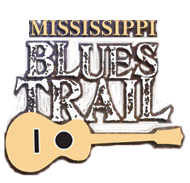Elmore James
Elmore James - Ebenezer
The cemetery of the Newport Missionary Baptist Church is the final resting place of Elmore James (1918-1963), often described as the “king of the slide guitar.” James’ electric style built on the approach of Robert Johnson and later influenced many blues and rock guitarists. Also buried here is Lonnie Pitchford (1955-1998), known for his skills on the one-string guitar or “diddley bow” and his dedication to keeping alive older traditions of Delta blues.
Elmore James embodied the dramatic style changes in the blues associated both with the mass migration of rural Mississippians to Chicago and with evolving electronic technology during the 1940s and ’50s. Born Elmore Brooks on January 27, 1918, in Richland, he first played a one-string guitar, and locals recalled that he soon constructed a multi-stringed instrument with a lard can. In the late ’30s James began performing with Robert Johnson and Sonny Boy Williamson No. 2 in Belzoni. Johnson’s boogie bass runs and slide guitar style were integral to James’ approach to the guitar. James also played with his adopted brother Robert Holston, sometimes with bands featuring horns and amplifiers. James lived on various farms in Holmes and Humphreys Counties before serving from 1943 to 1945 in the Navy. He returned to Mississippi as a decorated veteran.
James, who learned more about electronically amplifying his guitar while working at Holston’s radio repair shop in Canton, played on radio shows with Williamson in Belzoni and Helena, Arkansas, and made his debut recording in 1951 for Jackson’s Trumpet label. Williamson played harmonica on James’ record, “Dust My Broom,” a tune recorded by Robert Johnson in 1936, and James also backed Williamson and Willie Love on Trumpet sessions. After “Dust My Broom” became a national R&B hit, James began touring and moved frequently between Mississippi and Chicago. He recorded for Meteor, Modern, Chess, Fire, and other labels over the next decade, scoring hits with “I Believe,” “The Sky is Crying” and “It Hurts Me Too.” James, who had a longstanding coronary condition, died of a heart attack on May 24, 1963, at the Chicago home of fellow musician Homesick James Williamson. Following a wake in Chicago, James’ body was sent home to Mississippi for burial.
Lonnie Pitchford, who often played songs by Elmore James and Robert Johnson, was born near Lexington on October 8, 1955. His parents, Willie Douglas and Rosie Pitchford, and his brothers Rosby, Willie Douglas, A. J. and Charles also played guitar. As a child Pitchford built one-string “diddley bows” using baling or broom wire and snuff cans. After he began playing a regular guitar, he joined a high school band and also played in churches with gospel groups in the area and while living in Chicago, Kansas City, and Kalamazoo. In the 1970s he began showcasing his one-string guitar skills under the guidance of folklorist Worth Long, who also helped him meet and learn from blues veterans Eugene Powell, Sam Chatmon, and Robert Lockwood. Pitchford performed across the U.S., toured Europe and Australia, appeared on several albums, and was featured in films and on TV. Around Lexington, he was sometimes joined by guitarist Curtis Price, who, like Pitchford, worked as a carpenter, recorded with the Star Lite Singers gospel group, and was buried here. Price, born on May 2, 1956, died in an auto accident on July 19, 2010. Pitchford died on November 8, 1998.
content © Mississippi Blues Commission
[ BACK TO TOP ]

